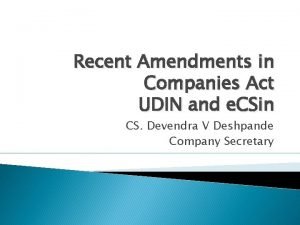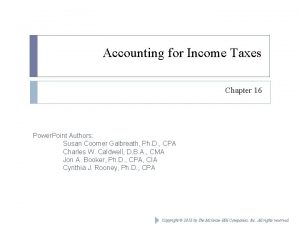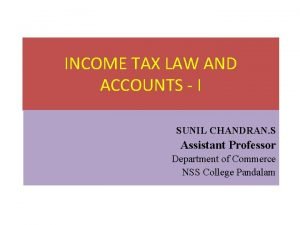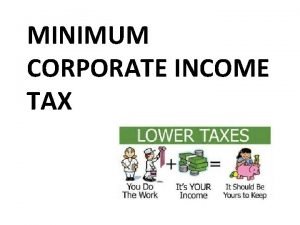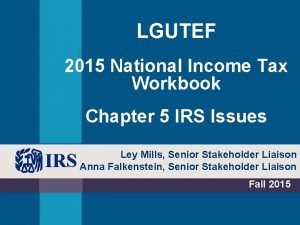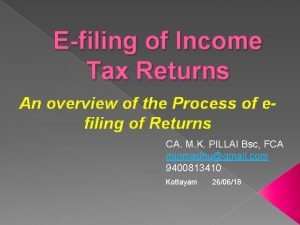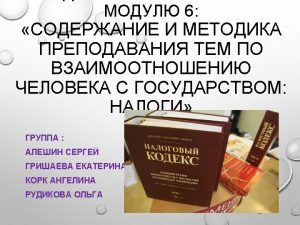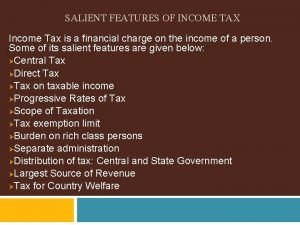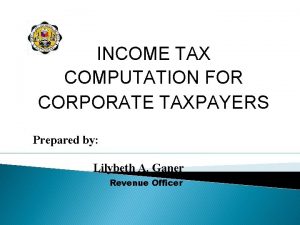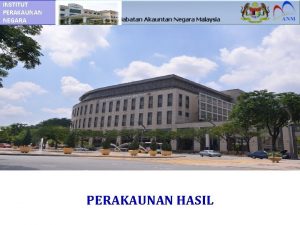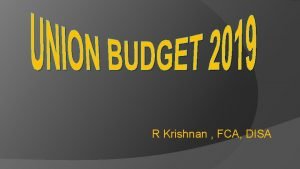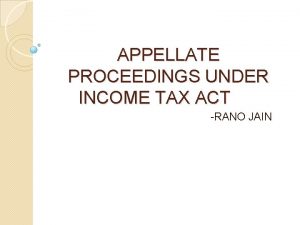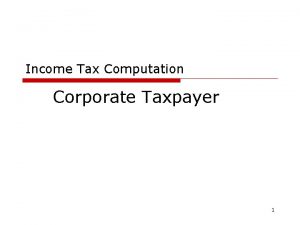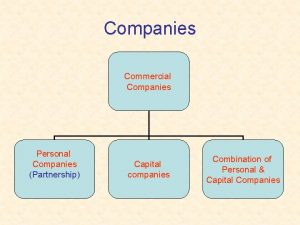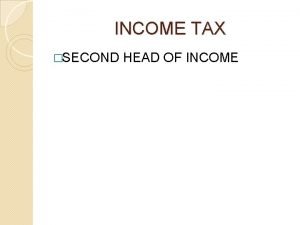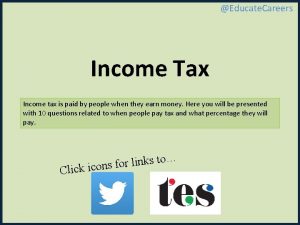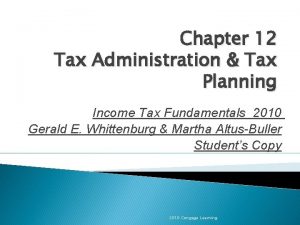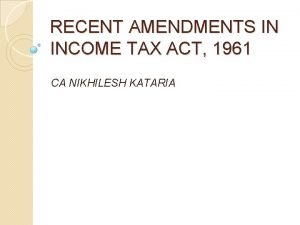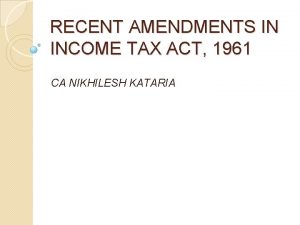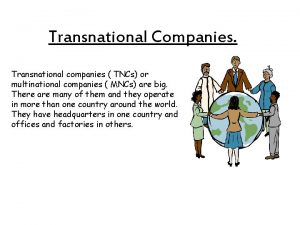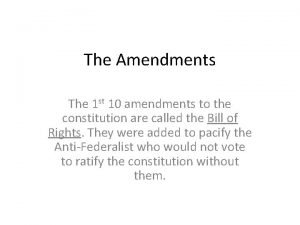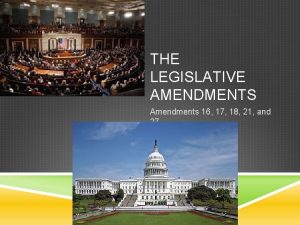COMPANIES INCOME TAX AMENDMENTS COMPANIES INCOME TAX AMENDMENTS1





















- Slides: 21

COMPANIES INCOME TAX AMENDMENTS

COMPANIES INCOME TAX AMENDMENTS/1 Section Amendment Implications 9 – Charge of Tax (4 amendments) i. • • Income that are subject to tax under the Capital Gains Tax Act (CGT), Petroleum Profit Tax Act (PPT) and Personal Income Tax Act (PIT) are not chargeable to tax under Companies Income Tax Act ii. Interest and dividend related to capital market lending transactions (i. e. Regulated Securities Lending Transactions “RSL Transactions”) are taxable under CITA iii. Limitation of what constitutes disposal of short-term instruments in relation to securities and shares under RSL Transactions that is chargeable to tax under CITA iv. Profits from securities lending other than compensating payments to lender or borrower are now taxable under CITA Regulated Securities Lending Transactions means any securities lending transaction conducted pursuant to rules made by the Securities & Exchange Commission (SEC) – Finance Act, 2019 Section 105 (1) Securities lending involves a temporary transfer of securities (shares or bonds from a lender to a borrower. The borrower provides collateral in return for the loan while the lender retains the economic benefits associated with ownership of the loaned securities. The borrower is contractually obligated to return the securities in the final transaction term. • New insertions Specific inclusion of taxable income from capital market lending transactions Introduction of a tax framework for securities lending transactions

COMPANIES INCOME TAX AMENDMENTS/2 Section Amendment Implications 10 Identification of a company (1 amendment) i. ii. Requirement of TIN of companies for banking transactions Mandatory requirement for TIN for taxpayers 13 – Nigerian companies (4 amendments) i. • New insertions • Inclusion of additional requirement for nonresident companies’ liability to tax in Nigeria • NRCs which ordinarily derives income from Nigeria suffers only WHT as final tax Replacement of identification of company by incorporation Full substitution and inclusion number (RC) with Tax Identification Number (TIN) which must be of two subsections displayed on all business transactions of the company. Income of non–resident companies engaged in digital, telecommunications and electronic businesses with significant economic presence in Nigeria is taxable in Nigeria, provided profit is attributable to the activity in Nigeria. ii. Income of non-resident companies from technical, management, consultancy or professional services performed outside Nigeria to a resident in Nigeria is taxable in Nigeria, provided the NRC has significant economic presence in Nigeria. Additional proviso applies to WHT deducted from other NRCs not covered by section 13 which shall be their final tax. iii. The scope of “significant economic presence” (SEP) is to be determined by the Minister. • The Minister has to provide a regulation to define SEP.

COMPANIES INCOME TAX AMENDMENTS/3 Section Amendment Implications 16 - Insurance companies (5 amendments) i. Taxable investment income for Life insurance companies is now defined as income from investment of shareholders’ funds Only the income from Life insurance company’s investment activities is taxable ii. Loss relief restriction to 4 years of assessments for insurance companies is no longer applicable. No more discrimination of insurance companies with respect to claim of loss relief and deductibility of expenses and outgoings iii. Restriction on reserve for unexpired risks to 25% and 45% of the total premium for marine cargo insurance business and other general insurance business respectively replaced with amount calculated on a time apportionment basis of annual acceptable risk. iv. Claim of deductibility of outstanding claims and outgoings for general insurance businesses now allowed up to total estimated amount of all outstanding claims and outgoings subject to adjustment of unutilized amounts in the following year’s tax computations. v. Restriction of taxable profit of general insurance business to 20% of gross premiums no longer applicable. vi. Minimum tax for insurance companies is now: (a) 0. 5% of gross premium for general insurance business, and (b) 0. 5% of gross income for life assurance business Alignment of minimum tax for insurance companies with other companies taxable under CITA

COMPANIES INCOME TAX AMENDMENTS/4 Section Amendment 19 – Dividend Tax (2 amendments) i. 20 – (1 amendment) Implications Dividend tax basis for CIT now excludes: Holding companies will no a) dividends paid out of retained earnings of profits already longer pay 62% as tax on taxed under CITA, PPTA or CGTA their investment income b) dividends paid out of pioneer profits or profits exempted from tax under CITA, PPTA, CGTA or any other legislation c) Franked investment income distributed as dividends, and d) Rental and dividend income of real estate investment company distributed to its shareholders ii. Exclusion of the dividends and distributions are irrespective of the year of the profit in which the dividend is declared, or distribution is made. More attraction to investments in companies i. Attraction of foreign direct investment in Nigerian companies Dividend tax basis for non-resident companies also no longer applicable.

COMPANIES INCOME TAX AMENDMENTS/5 Section Amendment 23 – Profits i. exempted (9 in 4 amendments) Implications Deletion of the provisions on withholding tax deduction at source from the list of profit exempted from tax and insertion of a new subsection to specify withholding tax obligations for companies exempted from tax Companies exempted from tax still have obligations to deduct withholding tax from payment of dividend, interest, rent or royalty. ii. Exemption of the profit of a small company from income tax during the period of income being below the tax paying threshold Profit of small companies with turnover below N 25 million threshold are exempted from income tax iii. Profits from exported goods are exempted from income tax to the Export proceeds not used as extent of the amount of export proceeds used for the purchase of prescribed shall be taxable raw materials, plant equipment and spare parts iv. Dividend and rental income received from real estate investment company exempted from income tax provided (a) a minimum of 75% of the dividend and rental income us distributed and (b) the distribution is made within 12 months of the financial year the distributed income was earned Investment in real estate sector now encouraged to support housing infrastructure gap

COMPANIES INCOME TAX AMENDMENTS/6 Section Amendment Implications 23 – Profits exempted (4 amendments) v. Compensating payments qualifying as dividend under section 9(1)(c) received by a lender from its agent or borrower on RSLT are exempted from tax as franked investment income Dividend from transactions directly between counterparties is exempted vi. Compensating payments qualifying as dividends or interest under section 9(1)(c) and received by an approved agent from a borrower or lender on behalf of the counterparty in RSLT are exempted from income tax Dividends and interest from transactions conducted through an approved agent is exempted vii. Shareholders are liable to tax on dividend or rental income from real estate investment company viii. Real estate investment company is taxable on its income from all sources ix. Dividend and rental income not distributed by a real estate investment company after 12 months from end of financial year the income is earned is taxable Provisions are included to curb abuse of the real estate investment incentives and mitigate double taxation of the dividend and rental income from real estate investment x. Companies engaged in agricultural production are exempted from tax in the first five years of production and renewable for additional three years subject to satisfactory production performance. Also, the companies cannot claim exemption under Agricultural production business now have tax exemption incentive of maximum of 8 years and

COMPANIES INCOME TAX AMENDMENTS/7 Section Amendment 24 - Deductions i. allowed (3 amendments) ii. Implications Condition for deductibility of expenses now includes that it should New inclusions to address be related to production of profits chargeable to income tax exclusivity of deductible expenses, curb profit shifting, encourage real estate investment and capital market Deduction of interest on working capital loans is now subject to lending transactions the provisions of the seventh schedule on deductible interest iii. Dividends or mandatory distributions made by a real estate investment company to its shareholders is deductible, only if duly approved by Securities & Exchange Commission. iv. Compensating payments qualifying as interest under section 9(1)(c) made by a lender to its approved agent or a borrower in a RSL Transaction are deductible

COMPANIES INCOME TAX AMENDMENTS/8 Section Amendment 27 - Deductions not allowed (4 amendments) i. There is no more: • requirement for Minister’s approval for local or foreign payment of management fee under a Management service agreement. • discretionary approval of the FIRS for deductibility of expenses of a Nigerian company incurred outside Nigeria ii. All related party expenses not consistent with the requirements of the Transfer Pricing Regulations are now to be disallowed for income tax purposes iii. Expenses related to exempt income, capital losses and expenses allowed as deduction under CGT are now specified as not deductible for CIT purposes. iv. Compensating payments made by a borrower which qualifies as dividend under section 9(1)(c) to its approved agent or a lender in a Regulated Securities Exchange (RSE) Transaction are not allowed as deduction for income tax purposes v. Compensating payments made by an approved agent which qualifies as interest or dividends under section 9(1)(c) to a borrower or lender in a RSE Transaction are disallowable Implications All related companies must ensure compliance with TP Regulations 2018 or stand the risk of their related party expenses being disallowed. This has been the practice which is now given legal backing

COMPANIES INCOME TAX AMENDMENTS/9 Section Amendment Implications 29 - Basis for computing assessable profits (3 amendments) i. Preceding year basis properly defined as accounting period immediately preceding the year of assessment Transition year may have overlap if the actual year basis was initially adopted ii. The applicability of the basis period for assessable profits now amended to specifically include non-Nigerian companies. iii. Assessable profits for commencement of a new trade of business are: • First year of assessment, profits from the commencement date of trade or business to the end of the first accounting period; • Second year of assessment, profit from the first day after the first accounting period to the end of the second accounting period; • Third and subsequent year of assessment, profits from the day after the accounting period just ended Commencement rule is no longer applicable and first three years of commencement is now based on profits of the first three accounting period but there may be challenged with transition in the fourth year. iv. Assessable profit of a company permanently ceasing trade or business is profits from the beginning of the accounting period to the date of cessation, but the tax must be paid within six months from the date of cessation. Cessation rule is no longer applicable. v. Conditions for exemption of business reorganization within group of Proviso included to curb artificial companies from commencement and cessation rules amended to include transaction from business the companies involved being members of the group 365 days before the reorganization

COMPANIES INCOME TAX AMENDMENTS/10 Section Amendment Implications 31 - Total profits from all sources (1 amendment) i. Deleting “but such deductions shall not be made against the profit of the company after the fourth year from the year of commencement of such business, ” in section 31(2)(a)(ii) Removal of restriction on loss relief for commencement of business 33 - Payment of Minimum tax (2 amendments) i. Basis of minimum tax completely overhauled and changed to 0. 5% of gross turnover of the company less franked investment income rather than the various parameters in the extant law Removal of payment of minimum tax from capital of a company making losses ii. Exemption from minimum tax now applies to only companies that earn gross turnover of less than N 25 million in the year of assessment categorized as “small companies”. No more exemption for Agric business, companies with 25% foreign equity and companies in their first four calendar years ii. Deductibility of interest expense on loans obtained for gas project with the prior approval of Minister for a gas project is no longer applicable ii. Elimination of double claim of tax free period under both the Industrial Development (Income Tax) Relief Act (IDITRA) and CITA 39 - Gas utilization (downstream operations) (2 amendments) Tax holiday under CITA cannot be claimed in addition to claims under pioneer legislation

COMPANIES INCOME TAX AMENDMENTS/11 Section Amendment 40 – Rate of tax i. (1 amendment) Categorization of companies and introduction of graduated rate of tax as follows: • Small company (exempted) • Medium company at 20%; and • Large companies at 30% 41 Deleted Replacement of obsolete plant and machinery (1 amendment) 43 - Dividends and tax on interim dividends paid by Nigerian companies (1 Deleted Implications Companies have to review their tax status in line with the categorization threshold.

COMPANIES INCOME TAX AMENDMENTS/12 Section Amendment 77 – Time within which tax (including provision tax) is to be paid (4 amendments) i. Provisional tax payment no longer applicable as the section has been deleted. ii. Categorization of companies and introduction of graduated rate of tax as follows: • Small company (exempted) • Medium company at 20%; and • Large companies at 30% iii. Payment of annual tax assessments must be made on or before due date of filing, in one lumpsum or instalments that must end not later than due date of filing and application for instalmental payment must be approved by the FIRS. iv. Payment of tax due 90 days before due date of filing entitles the taxpayer to bonus of: • 2% for medium-sized company • 1% for any other company on tax payable as credit against future taxes Implications

COMPANIES INCOME TAX AMENDMENTS/13 Section Amendment Implications 78 – Deduction of tax from interest, etc. (1 amendment) Deduction of WHT on interest shall not apply to a lender making compensating payments which qualify as interest under section 9(1)(c) to an approved agent for the benefit of a borrower under RSL Transaction No WHT on the compensating payments qualifying as interest because the underlying transaction is exempted from income tax in section 23 80 - Deduction of tax from dividend (2 amendments) i. New subsection 5 but should be subsection 6 considering that the old subsection 1 -5 was not deleted Deduction of WHT on dividend shall not apply to: • Company or person making distribution or dividend payment to real estate investment company • A borrower making compensating payments to its approved agent or lender, provided the payments qualify as dividends under section 9(1)(c) • An approved agent making compensating payments received from a Borrower which qualify as dividends under section 9(1)(c) to a lender ii. Real estate investment company must deduct WHT from the dividend distributed to its own shareholders New subsection 6 which should be subsection 7

COMPANIES INCOME TAX AMENDMENTS/14 Section Amendment Implications 81 - Deduction of tax at source (2 amendments) i. WHT rate for construction contract reduced from 5% to 2. 5% 105 – Interpretation (3 amendments) i. ii. Amendment of subsection 2 to include withholding tax rate of 2. 5% for road, bridges, building and power plant construction contract. Exclusion of compensating payments made under RSL Transaction from WHT deduction as source FIRS properly defined as Service and not Board (FBIR) in line with the provisions of FIRSEA 2007 ii. Reference to FIRS as FBIR no longer applicable iii. New terms defined (a) Approved agent, (b) Bank, (c) Banking, (d) Borrower, (e) Compensating payments, (f) Financial Institutions, (g) Financial services, (h) Gross turnover, (i) Large company, (j) Lender, (k) Medium-sized company, (l) Real estate investment company, (m) Recognized group of companies, (n) Regulated Securities Lending Transaction (o) Small company Third Schedule (2 i. amendments) ii. Table of tax exemption on interest on foreign loans updated to reduce tax exemption rates to 70%, 40% and 10%) Interpretation section now included to define (a) moratorium and (b) repayment period Tax exemption rates reduced by 30% across board

COMPANIES INCOME TAX AMENDMENTS/15 Section Amendment Implications Seventh Schedule (1 amendment) i. Seventh schedule of deductible interest inserted with 6 new paragraphs on disallowed excess interest on foreign intercompany loans Condition for deductibility of intercompany interest on loans now specified ii. Interest of foreign intercompany loan shall be benchmarked to 30% of Earning before interest, taxes, depreciation and amortization of the Nigerian company in the relevant accounting year Thin capitalization rule introduced by way of interest deduction cap based on EBITDA iii. Rules not applicable to intercompany banking and insurance transactions iv. Provision for carrying forward intercompany interest subject to deduction cap and limited to 5 years of assessment from the year of excess interest computation v. Penalty for non-compliance to the interest deductibility benchmark is 10% and interest at CBN Monetary policy rate plus a spread as determined by the Minister, on the excess interest charged during the year

PERSONAL INCOME TAX AMENDMENTS

PERSONAL INCOME TAX AMENDMENTS/1 Section Amendment Section 2, 49, 86, 102, 108 (1 amendment) Reference to FBIR in PITA now redefined as FIRS in 5 sections 20 – Deductions allowed (I amendment) Condition for deduction of contribution to pension, provident or other retirement benefit fund is replaced with full deduction of contribution to pension, or other retirement benefit fund, society or scheme for PIT purposes 33 - personal reliefs and relief for children, dependants (1 amendment) Provisions related to (a) alimony allowance (b) children allowance, (c) dependant relative, (d) life insurance relief, and (e) disability allowance have been deleted 49 – Requirements for tax identification number is now a precondition for Information to the opening and continuous operation of bank accounts for the be delivered by purpose of business operations Implications This amendment will discourage individuals from taking life insurance policies. It is not clear if the intention is to create this impact on insurance business All registered businesses must obtain TIN and provide same to their bankers.

PERSONAL INCOME TAX AMENDMENTS/2 Section Amendment Implications 58 – Revision in case of objection (1 amendment) Mode of service of objection notice under subsection 1 now includes delivery in person, by courier and via email. Objection is validly submitted if done through courier or electronic means 74 – Penalty for failure to deduct (1 amendment) Extension of penalty provision to cover all forms of tax deduction obligations, such as deduction of tax from interest, dividends, directors and other payments Third schedule Income exempted (4 amendments) Interest on government bonds are exempt for PIT purposes without reference to the authority of Railway loan (International Bank) Act Section 108 – Interpretation (3 Reference to 1 January 1997 is no longer applicable to exemption of interest on bank loans for agriculture and other specified businesses. Deletion of income exempted in relation to employment by the Ohio University, Pensions related to orphans, gratuities paid to contract staff of Nigerian College of Arts and Science and Technology, gratuities related to employees of Nigerian Research Institute, etc. Removal of obsolete paragraphs in the Third Schedule in relation to pension and other types of incomes. Proviso related to gratuity payable to employees in the private sector now removed No more cap on exemption of gratuity from income tax Reference of Board as Joint Tax Board no longer applicable and replaced with Service as defined under the FIREA This amendment need to be aligned with the provisions of

VALUE ADDED TAX AMENDMENTS

VALUE ADDED TAX AMENDMENTS/1 Section Amendment Implications 2 – Taxable goods and services (1 amendment) i. Scope of taxable goods and services under VAT Act amended in the new substitution to delete reference to ‘taxable goods and services’ and exclude specific reference to ‘goods and services’ in relation to items listed in the First Schedule to the Act Substitution is to expand the scope of items taxable for VAT purposes to include items that are neither goods nor services ii. Supply of goods in Nigeria is deemed to include: a) Goods that are physically present in Nigeria at the time of the supply, imported into Nigeria for use by a person, assembled in Nigeria or installed in Nigeria, or b) the beneficial owner of the rights in or over the goods is a taxable person in Nigeria and the goods or right is situated, registered or exercisable in Nigeria. Definition of supply of goods in Nigeria is now expanded to cover both physical goods and intangible assets, which is the rights over the goods provided they are related to Nigeria. 4 – Rate of Tax (1 amendment) iii. Supply of services in Nigeria is deemed to include: a) Services rendered by a person physically present in Nigeria as at the time of providing the service, or b) Services provided to a person in Nigeria, whether it is performed in Nigeria or abroad. Supply of services in Nigeria to be determined based on the place of providing or consumption of the service, being in Nigeria. VAT rate increased from 5% to 7. 5% of the value of taxable goods and services VAT rate increased with the expectation of an increase in govt. revenue
 Udin generate icsi
Udin generate icsi Net operating income
Net operating income Deferred tax asset journal entry
Deferred tax asset journal entry Value added approach formula
Value added approach formula What is a tax base
What is a tax base Perquisites in income tax
Perquisites in income tax Mcit tax
Mcit tax National income tax workbook
National income tax workbook Efilingofincometax
Efilingofincometax Calculate federal income tax
Calculate federal income tax Taxes in russia
Taxes in russia Features of income tax
Features of income tax Income tax meaning
Income tax meaning Personal income tax computation
Personal income tax computation Titik pengiktirafan hasil
Titik pengiktirafan hasil Easy office download
Easy office download Income tax ordinance 2001
Income tax ordinance 2001 195 of income tax act
195 of income tax act Form 35 income tax
Form 35 income tax Income tax computation format
Income tax computation format Taxpayer identifying number
Taxpayer identifying number How to file income tax return in winman software
How to file income tax return in winman software
